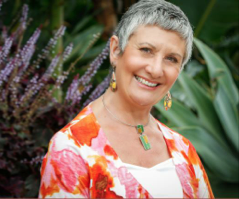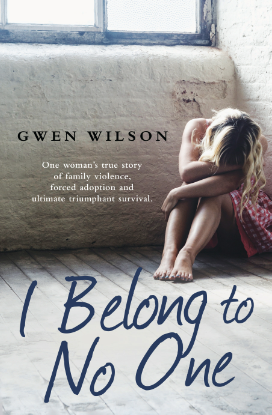Gwen had a tough childhood growing up in 1970s Australia. Fatherless and with her mother suffering psychiatric illness, Gwen fought hard to survive. But things got worse. Here, she reveals the inspiring lessons she learnt…
Gwen Wilson, author of I Belong to No One, experienced more hardships than any teenager ever should while growing up in Western Sydney. From a childhood drenched in prejudice and with a mother in and out of psychiatric hospitals, Gwen faced ongoing hardship, but fought hard for a bright future.
When she fell pregnant at 16, things got worse. Determined to save her son, Jason, from the same discrimination she battled as an ‘illegitimate child’, Gwen married. Rape, domestic violence, poverty and homelessness quickly followed. In 1974, in the dying days of forced adoption in Australia, the isolated teenager was forced to make a decision about her child that would tear her life apart.
In this exclusive, Gwen writes about some of the lessons she has learned – lessons of survival, forgiveness, empathy, acceptance and more. Be inspired…
“What I’ve learnt about….
“…growing up without a father?
As a young child I thought a father was a man who visited twice a year. As time went on, I mostly accepted not having one without much analysis or yearning. Nevertheless, there were times I felt I was missing out on something that my school-mates had, and I imagine my upbringing would have been quite different if I had a father to shield me. Ultimately, though, I learnt that it is harder to have someone special in your life and to lose that person, than it is to have never known them in the first place.”
“…having a mum with psychiatric illness?
My mother could not nurture me, and I learned it was fruitless and unfair of me to expect her to. That is sad, sad for both of us. What would be sadder still is if I blamed her for that. It is not as if there weren’t other people who tried to fill the void. Learning to forgive, though, took time and experience. I had to put a lot of resentment and bitterness behind me.
Through her illness, I learnt many skills which have been invaluable, particularly in my corporate career: body language is more powerful than words; surface behaviours have an underlying trigger; how to interpret situations through other people’s eyes; and that we have the power to change the negative messages we send ourselves.”
“…being a pregnant teen?
People will judge you simply because you are a teenager, and fail to assess your maturity level, ability to parent a child, relationship with the father, and what support network you have in place. The most vocal critics are those least likely to help shore up the support network, and it is that support network which is most vital to a young mother’s success.”
“…discrimination?
When I fell pregnant outside of marriage, I expected to be discriminated against, and I was. It was so ingrained into our society’s mores. Good girls did not have sex before marriage. Only sluts gave birth to illegitimate babies. Thank goodness these terms are no longer considered acceptable, yet discrimination in our society continues to exist, and at any point in time, someone or some group will be the target. Discrimination is a reflection of the current views of the majority of the society, and it is as if we hold a collective need to feel better about ourselves, by making someone else feel unworthy.”
“…domestic violence?
Domestic violence takes many forms, means different things to different people, may be constant or intermittent, is more widespread that many people realise, men as well as women can be victims, and children who are raised in a violent household are likely to become abusers.”
“…forced adoption?
The practice of removing babies from unmarried mothers, for the purpose of passing those babies to infertile couples, occurred from the 1950s until the mid-1970s in Australia. This practice has come to be known as ‘forced adoption’.
It is a commonly held belief that babies given up for adoption were unwanted and surrendered willingly by their mother but this is not the case.
Mothers signed the adoption papers as if indicating that it was their decision not to raise their own child. In truth, there was rarely an alternative choice. Apart from the very real practicality of how a single mother could afford it, there was the shame and social stigma to be faced.
It was hammered into single mothers that any desire to keep their baby was selfish. They were being selfish towards their baby, and selfish towards the adopting parents who desperately want to have a child, and who could do everything for that child that its own mother could not.
Mothers were persuaded to sign the adoption papers in the best interests of the child, and many women were convinced they were doing the right thing. They were urged to spare their baby the stigma of illegitimacy, besides which, could they not understand that a woman who had sinned by having pre-marital sex was unfit to mother a child?
Those mothers who signed adoption papers were told to forget they had given birth, and that when the time was right, they would have their family then. Some women, like me, never went on to have another child.”
“…finding myself?
That the job is never done. I have never been a woman who has reached a certain age and can say I am ‘comfortable in my own skin’. I am often insecure and plagued with self-doubt. I just have enough maturity and experience to recognise when I am, and what is driving it.
“…finding happiness?
Not to make your happiness dependent on some future event. It will probably never eventuate anyway. Stay in the moment and look for the positives now.”
About Gwen
Gwen Wilson started writing her memoir in her fifties. She worked as a motel receptionist and dental nurse before chancing onto work in the male-dominated waterfront at nineteen. A stable marriage and successful career in shipping and logistics followed until she retired. After retirement Gwen entered university for the first time and she now holds a Masters in Electronic Commerce. Gwen lives in Wollongong, New South Wales. I Belong to No One by Gwen Wilson ($29.99) is published by Hachette Australia.
Did you learn some tough lessons growing up? Tell us your experiences below…










Such honesty in this story and a compelling read.
Gwen, you are truly amazing. To show such resilience, optimism, drive, determination, compassion and understanding under extraordinary circumstances – an incredibly inspiring story. Thank you.
I completely agree with Franki. Thank you for sharing your story with TheCarousel.